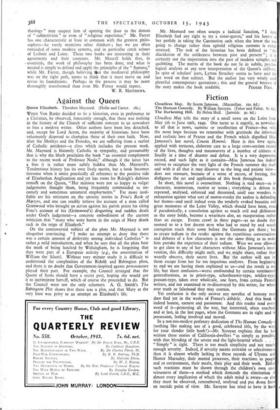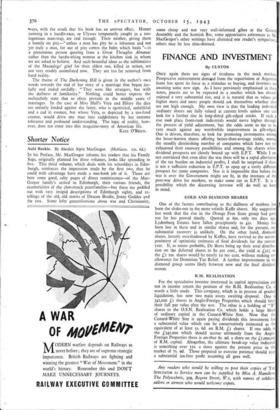Fiction
Cloudless May. By Storm Jameson. (Macmillan. ios. 6d.) The Human Comedy. By William Saroyan. (Faber and Faber. 8s. 6d.) The Darkening Hill. By Helen Hull. (Jarrolds. gs. 6d.)
Cloudless May tells the story of a small town on the Loire from May 5th to June 19th, 1940. One turns to it eagerly, as nowadays to all that is news, surmise or recollection of France—but with the more hope because we remember with gratitude the informed and realistic love of France and the French which dignified Miss Jameson's last novel, Cousin Honore.- Here is this love again, applied with tortuous, elaborate care to a large cross-section record of the lives, thoughts and manoeuvres of a number of citizens of Seuilly in a time of disaster and defeat. It is a very depressing record, and such light as it contains—Miss Jameson has indeed striven to recapture the very light of the French summer slty itself and with it all that it may discover to the long and patient view— does not reassure, because of a sense of excess, of forcing, that disfigures the art and application of this book throughout.
In short, this novel is overwritten. Nothing is said once—as to character, mannerism, motive or scene ;. everything is driven in, repeated, analysed, enforced and decorated, until one wonders in exhaustion against what sort of moron-reader the author is defending her theme—and until indeed even the tenderly evoked beauties and great memories of the Loire Valley, which should have been, even if paradoxically, a consolation against so much evil and dishonour as the story holds, become a weariness also, an exasperation rather than an escape. Events crawl in these pages—as no doubt they seemed to to a few decent men who had to stand by and watch corruption reach their town before the Germans got there ; but to create tedium in the reader against the repetitious conversations and debates of a few characters is not the same thing as to make him partake the experience of their tedium. Were we ever allowed to get close to any of her characters without Miss Jameson's inter- vention, this difficulty might melt, and wet might share, rather than wearily observe, their secret lives. But the author will not let them escape from her far too imperious analyses. From beginning to end we are having them explained to us—and the result is not, life, but sheer confusion—worse confounded by certain sentimental generalisations, as to priest-type, schoolmaster-type, soldier-typ; peasant-type, taken over whole3ale, one fears, from certain French writers, and not examined or re-discovered by this writer, for what- ever truth or falsehood they may contain.
Yet confusion is the only answer any novelist of honesty may dare find yet in the weeks of France's debacle. And this book is indeed honest, earnest and passionate. And this reader read every word of it—protesting all the way, but interested, often touched, and at last, in the last pages, when the Germans are in sight and in possession, feeling involved and moved.
In a not-too-modest prefatory dedication of The Human Comedy— (nothing like making use of a good, celebrated title, by the way, for your slender little book !)—Mr. Saroyan explains that he has written these stories of California-dwellers " as simply as possible, with that blending of the severe and the light=hearted which . .
" Simply " is right. There is too much simplicity and not nearly enough severity. Indeed, if severity means restraint or selectiveness, then it is almost wholly lacking in these records of Ulysses and Homer Macauley, their mental processes, their reactions to people and such environment, their meals, their play and their work. Either such reactions must be shown through the children's own cod- sciousness of them—a method which demands the elimination of almost every implication of which the adult mind is aware—or else they must be observed, remembered, analysed and put down front an outside point of view. Mr. Saroyan has tried to have it both
ways, with the result tha: his book has an uneven effect. Homer running in a hurdle-race, or Ulysses temporarily caught in a too- ingenious man-trap, are real enough. Their mother, giving them a homily on pity—" unless a man has pity he is inhuman and not yet truly a man, for out of pity comes the balm which heals "—is a pretentious person quoting from a Great Thoughts Almanac rather than the hardworking woman at the kitchen sink in whom we are asked to believe. And such beautiful ideas as the sublimation of the Macauleys' grief for their eldest son, killed in action, are not very readily assimilated now. They are too far removed from hard reality.
The theme of The Darkening Hill is given in the author's own words towards the end of her story of a marriage that began joy- fully and ended sordidly : " They were like strangers, but with the dullness of familiarity." Nothing could better express the melancholy state that so often prevails in the middle years of marriages. In the case of Miss Hull's Vera and Hilary the dice are unfairly loaded against the latter, who is egotistical, unfaithful and a cad in essence, but whose Vera, as depicted by a too-fond creator, would drive any man into caddishness by her extreme tolerance and profound understanding. The logic of reality, how- ever, does not enter into this magazine-story of American life.
KATE O'BRIEN.



























 Previous page
Previous page